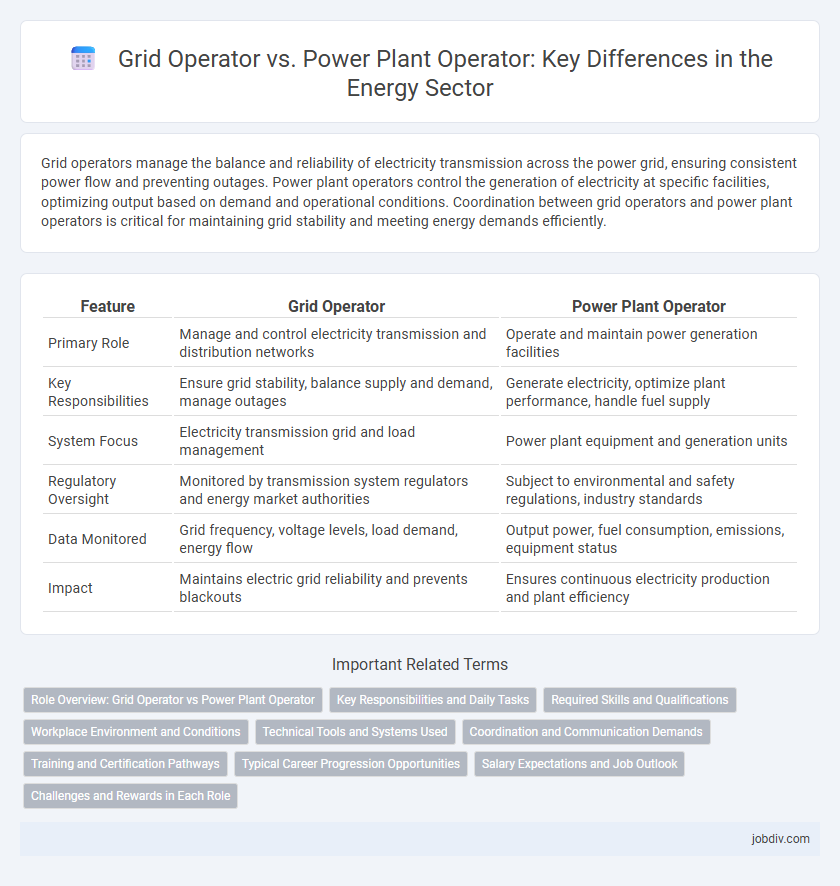Grid operators manage the balance and reliability of electricity transmission across the power grid, ensuring consistent power flow and preventing outages. Power plant operators control the generation of electricity at specific facilities, optimizing output based on demand and operational conditions. Coordination between grid operators and power plant operators is critical for maintaining grid stability and meeting energy demands efficiently.
Table of Comparison
| Feature | Grid Operator | Power Plant Operator |
|---|---|---|
| Primary Role | Manage and control electricity transmission and distribution networks | Operate and maintain power generation facilities |
| Key Responsibilities | Ensure grid stability, balance supply and demand, manage outages | Generate electricity, optimize plant performance, handle fuel supply |
| System Focus | Electricity transmission grid and load management | Power plant equipment and generation units |
| Regulatory Oversight | Monitored by transmission system regulators and energy market authorities | Subject to environmental and safety regulations, industry standards |
| Data Monitored | Grid frequency, voltage levels, load demand, energy flow | Output power, fuel consumption, emissions, equipment status |
| Impact | Maintains electric grid reliability and prevents blackouts | Ensures continuous electricity production and plant efficiency |
Role Overview: Grid Operator vs Power Plant Operator
Grid operators manage the electricity transmission network, balancing supply and demand in real-time to ensure grid stability and prevent outages. Power plant operators control and maintain generation units, optimizing power output while adhering to safety and environmental regulations. Both roles require coordination to maintain efficient energy flow from generation to end-users.
Key Responsibilities and Daily Tasks
Grid operators monitor and control the electrical grid to ensure stable power distribution, balancing supply and demand in real-time and responding to outages or fluctuations. Power plant operators manage the operation and maintenance of generation units, overseeing equipment performance, fuel use, and safety protocols to optimize power production. Both roles require coordination with dispatch centers and adherence to regulatory standards but focus on different stages of energy delivery from generation to transmission.
Required Skills and Qualifications
Grid operators require expertise in real-time system monitoring, load balancing, and emergency management, with certifications in electrical engineering or energy systems often preferred. Power plant operators need strong mechanical and technical skills to manage turbine operations and maintenance, typically holding licenses such as the Federal Energy Regulatory Commission (FERC) certification or equivalent. Both roles demand proficiency in control systems software, safety protocols, and regulatory compliance, but grid operators emphasize systemic coordination while power plant operators focus on equipment performance and reliability.
Workplace Environment and Conditions
Grid Operators manage complex control rooms equipped with real-time monitoring systems, requiring high concentration and rapid decision-making under stress. Power Plant Operators work directly on-site, often in physically demanding environments with exposure to machinery noise, heat, and strict safety protocols. Both roles demand vigilance and technical expertise, but Grid Operators prioritize cognitive endurance while Power Plant Operators face more tangible operational hazards.
Technical Tools and Systems Used
Grid Operators utilize advanced SCADA (Supervisory Control and Data Acquisition) systems and energy management software to monitor and control the electrical grid in real-time, ensuring stability and demand-response balancing. Power Plant Operators rely on distributed control systems (DCS) and programmable logic controllers (PLC) for precise regulation of generation units, fuel input, and emissions control. Integration of smart sensors and IoT technology enhances operational efficiency and predictive maintenance for both roles in energy infrastructure management.
Coordination and Communication Demands
Grid operators manage real-time electricity flow and require constant coordination with multiple power plant operators to ensure grid stability and prevent outages. Power plant operators focus on maintaining generation output and must communicate precise operational data to grid operators to align supply with demand fluctuations effectively. This continuous exchange of information is critical for balancing energy production and maintaining reliable grid performance.
Training and Certification Pathways
Grid operators undergo specialized training in grid management, system reliability, and real-time load balancing, often obtaining certifications such as the North American Electric Reliability Corporation (NERC) credentials. Power plant operators receive focused education on plant-specific systems, including turbine operation, safety protocols, and emergency procedures, with certifications like the Certified Power Plant Operator (CPPO). Both roles require continuous training to stay updated with technological advancements and regulatory standards in the energy sector.
Typical Career Progression Opportunities
Grid operators often advance through roles such as system dispatcher, network controller, and grid management specialist, gaining expertise in real-time electricity distribution and demand forecasting. Power plant operators typically progress from entry-level technician to control room operator, and eventually to plant manager or operations director, emphasizing equipment maintenance and production efficiency. Both career paths offer opportunities to transition into regulatory, engineering, or energy trading positions, leveraging their operational knowledge for broader energy sector roles.
Salary Expectations and Job Outlook
Grid operators typically earn an average salary ranging from $60,000 to $85,000 annually, with job growth driven by the increasing demand for reliable electricity distribution and smart grid technologies. Power plant operators generally command higher salaries, often between $70,000 and $95,000 per year, due to the technical expertise required in managing generation facilities and meeting regulatory standards. Both roles offer stable job outlooks, but power plant operators face a slight decline due to automation, while grid operators benefit from expanding roles in renewable energy integration and grid modernization.
Challenges and Rewards in Each Role
Grid operators manage the real-time coordination of electricity flow to balance supply and demand, facing challenges such as grid stability, outage management, and integrating renewable energy sources. Power plant operators focus on the efficient and safe operation of generation units, tackling issues like maintenance scheduling, fuel optimization, and compliance with environmental regulations. Both roles offer rewards through critical contributions to energy reliability and sustainability, with grid operators ensuring system-wide stability and power plant operators optimizing generation performance.
Grid Operator vs Power Plant Operator Infographic

 jobdiv.com
jobdiv.com